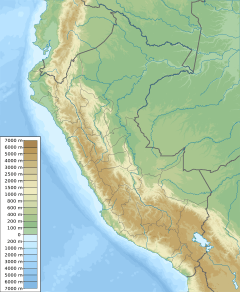Atelopus eusebiodiazi facts for kids
Quick facts for kids Atelopus eusebiodiazi |
|
|---|---|
| Conservation status | |
| Scientific classification |
|
| Kingdom: | Animalia |
| Phylum: | Chordata |
| Class: | Amphibia |
| Order: | Anura |
| Family: | Bufonidae |
| Genus: | Atelopus |
| Species: |
A. eusebiodiazi
|
| Binomial name | |
| Atelopus eusebiodiazi Venegas, Catenazzi, Siu-Ting and Carrillo, 2008
|
|
| Atelopus eusebiodiazi is only known from Huamba, in Piura Region, northwestern Peru | |
| Script error: The function "autoWithCaption" does not exist. | |
Script error: No such module "Check for conflicting parameters".
Atelopus eusebiodiazi is a type of toad that belongs to the Bufonidae family. It is a special kind of toad because it is only found in one small area in northwestern Peru. This area is called Huamba, near a place called Ayabaca in the Piura Region. The toad's name, eusebiodiazi, was given to honor Eusebio Diaz. He was a taxidermist (someone who prepares animal specimens) at the Museum of Natural History, Lima. He was also the person who first collected this specific toad.
Contents
What Does This Toad Look Like?
Atelopus eusebiodiazi is a fairly large toad for its group.
- Adult males are about 36 to 41 millimeters long.
- Adult females are a bit bigger, measuring about 43 to 47 millimeters.
This measurement is taken from their snout (nose) to their vent (tail end).
Body Features
The toad's head is longer than it is wide. It does not have a visible eardrum, which is called a tympanum. Its body is strong and sturdy, with legs that are quite short.
Hands and Feet
The fingers on its front feet are not connected by skin (unwebbed). However, its toes on the back feet have some webbing.
Colors and Patterns
Scientists do not know the exact colors of these toads when they are alive. This is because they have only been seen after being preserved. When preserved, their back (called the dorsum) can be chocolate brown. It might have irregular black spots and some yellowish-cream patches on its sides. Or, its back might be black with irregular yellowish-cream marks. It can also have a yellowish-cream stripe along its upper sides. The belly (called the venter) is usually cream-colored. Sometimes it has small black spots. The palms of its hands and the soles of its feet are also cream-colored.
Where Does This Toad Live?
Atelopus eusebiodiazi lives in cloud forests. These are special forests high up in the mountains. They are often covered in clouds or mist. These toads live at elevations of about 2,950 meters (about 9,678 feet) above sea level.
Where They Are Found
Scientists have seen these toads in leaf litter on the forest floor. They have also been found along small streams. It is thought that they lay their eggs and breed in these fast-flowing streams.
Why Is This Toad in Danger?
The Atelopus eusebiodiazi toad is in serious trouble. As of 2018, no one had seen this species since 1997. Scientists looked for them in 2001 and 2006 but could not find any.
Possible Extinction
It is possible that this toad is now extinct. This means there are no more of them left alive. Only small areas of their natural home remain.
Threats to Their Home
The main reason for their disappearance is habitat loss. This means their natural living areas are being destroyed.
- More and more cattle are grazing in the area.
- Land is being used for farming.
These activities are taking away the cloud forest habitat that the toads need to survive.
 | Anna J. Cooper |
 | Mary McLeod Bethune |
 | Lillie Mae Bradford |



